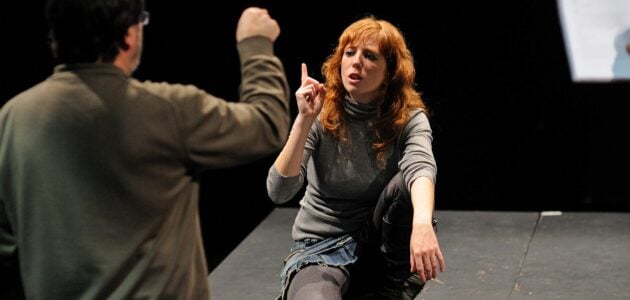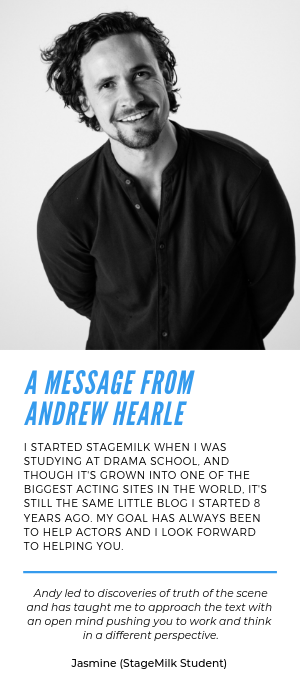
What Makes a Great Director?
Of all the many disciplines in the creative arts, the role of director is one of the most alluring and mysterious. Directing is about maintaining a creative vision. Directing is telling actors where to stand. Arguably, directing is also about making frames with your fingers on a film set and pointing the camera, wearing riding pants and yelling through a megaphone. Given the diversity of skills and knowledge sets required to do the job (especially across stage and screen media), it can be hard enough to define what directing actually entails—let alone what makes a great director.
A great director is an artist who is able to lead and nurture a creative team: offering guidance and support where needed, as well as the required space for talented collaborators to bring their best to the project. They must plan for every opportunity, know when to hold to their own creative vision and yet also respond to external stimuli.
In this article, we’ll not only answer the question of “What makes a great director?”, we’ll examine the qualities that can make any director great. Because it’s not about fame, influence or being Steven Spielberg (although that would probably help you along). It’s all about the skills and mindset that any director can use to improve and refine their craft.
What is a Director?
Okay, tricky stuff out of the way first: in its most reductive form, a director is a person who is in charge of all creative aspects of a production. Their primary goal is to maintain a singular ‘vision’ for the project—which is to say all the elements of narrativity and design have to fit together harmoniously.
In pre-production and planning, directors will work with HODs (heads of department) in unifying design elements. When casting, they will work with casting directors and producers to find the right actors that fit the project, and then rehearse with the actors to ensure they are ready for the production itself. Depending on the project—but particularly in the case of film and television—the director may also work with the writer on strengthening and modifying the script.
In practice, the director’s role varies between the media of screen and stage:
Directing for Screen
“The work of the director is the work of constructing the shot list from the script.” – David Mamet
A director of film/television is under some of the most pressure in any industry—creative or otherwise. Not only are they responsible for all of the above pre-production elements, they will find themselves in the thick of a thousand decisions an hour every day on set, which could be for months at a time. Screen directors also have a hand in post-production, overseeing elements such as editing and visual effects.
Screen directors are some of the most celebrated artists in the creative industry. The most renowned are paid millions for their work, and endure little in the way of studio meddling and hardship enduring financing. However, this public-facing image of the job is a double-edged sword. Screen directors are often judged for the success or failure of a project, despite being one of literally hundreds of elements that might contribute.
Directing for Stage
“You become a director by calling yourself a director and you then persuade other people that this is true.” – Peter Brook
Directing theatre presents its own set of challenges for a director. Engagements in theatre tend to be shorter: usually two-to-three months. But much of this is covered by a rehearsal process that is unheard of in the screen world. A theatre director will work with actors 9-5, up to six days a week, on pulling a text or concept apart. As the director can’t coach actors in between scenes like in film (without annoying the audience), everything must be carefully worked out beforehand so the play effectively runs itself each night.
Theatre directors don’t enjoy the same level of fame as their screen counterparts. However, there are some examples of directors, like Neil LaBute and Sam Mendes, who fit and work comfortably and with acclaim in both words. Theatre directors may have to endure smaller budgets, but often find their work is more enriching in a theatre context—simply for the time afforded to them to bring the world to life.
Leadership
Let’s get back to the topic at hand. What makes a great director? Leadership. Makes sense, right? It might seem like an obvious point to make, but great directors are great leaders. They know how to get the best out of their team, how to inspire them and how to help them create the best art possible. But while that might sound simple, it’s often complicated by the simple fact that being a director is to have power. And just because somebody’s in charge does not mean that they’re a great leader. Some directors struggle to wield their power effectively, or even ethically. Some directors (particularly spoiled, white men in Hollywood) make entire careers out of being screaming balls of anger when the slightest thing goes wrong.
So perhaps a better question for us to ask is “what makes a great leader?” A great leader knows when to direct (eyy) their team, and when to give them the space to bring their own expertise. Martin Scorsese is famous for being a hands-off director, who happily diverts to his cast and crew so that they can bring their own ideas and talents to the table. To name-check Sam Mendes again, he worked with his actors developing his stage production Lehman Trilogy for a full year before it began its celebrated West-End run.
In a post-Weinstein world, where the toxicity of masculine power grabs in Hollywood are diminishing (or, at the very least, becoming more known and less tolerated), it is heartening to see the next generation of powerhouse directors diverting attention and goodwill to the creatives who support them. That is good leadership. And it makes for great directors.
Having a Plan…
Great directors have a plan in mind. Whether they storyboard every last shot or spend months in the Andes meditating and taking mushrooms, great directors know the direction their project needs to take and do their best to guide their people there. For some more established directors, plans can sometimes give way to what we might call a “process”: a recurring methodology they might employ when creating their work. British director Mike Leigh is famous for just such a process: the ‘Mike Leigh Method’ has actors rehearsing and improvising for months prior to filming so that their interactions can inform the script and film.
Plans, for directors, must also operate on a macro and micro level. Good directors don’t just map out the production as a whole. Theatre directors plan day by day, film directors minute by minute as there is not a moment to waste on set or stage. However, as with leading and managing talent, directors also know when to allow time for rehearsal, or improv, or contingency to try different options and manage new plots.
…But Knowing when to Pivot
When it came to blowing up the airfield, they had one shot. Steven Spielberg, directing an adaptation of J.G. Ballard’s Empire of the Sun, tells a 13-year-old Christian Bale to jump for joy when the crew detonates an elaborate pyrotechnics effect. The cameras roll, the explosion goes off … and Bale freezes. Smoke billows up, the building is gone, he just stands there. In b-roll shot for the making-of documentary, you can see Spielberg allow himself perhaps a second of frustration, before directing his crew to shoot other things and then re-work the scene with the young star. The result? A triumphant moment of cinema where Bale’s choke becomes awe in the face of death and the thrill of war.
Spielberg delivers a masterclass in how great directors should be ready to pivot: not only away from their carefully laid plans, but towards true greatness when they see an opportunity to strike. While you may not be able to see the clip we’ve discussed without tracking down the documentary itself (remember DVDs?), we did find another example of the genius at work. Take a look at the below clip of Steven Spielberg on the set of Jurassic Park—he is totally prepared, and yet finds inspiration in the moment in ways that help shape the day’s shooting:
Communication
If we had to focus on a single aspect of a director’s skill set that marks them for greatness, it would be their ability to communicate. Great directors are able to convey and communicate their ideas. They’ll need to do so to designers to ensure their vision is properly captured, the DOP to ensure that the film is shot and lit the correct way. They’ll need to pitch to producers and money people in a way that excites and builds confidence. And, most importantly, they’ll need to connect with the actors. They’ll talk them into the characters and worlds, keep them feeling safe and supported and heard, help them identify the objective in each scene and the actions they’ll play to overcome all obstacles.
Of course, we’ve left one important group of people out…
The best definition I’ve ever heard about a director’s role was from a lecturer at film school. “A director’s job is to direct the audience to what’s important in the story.” At the end of the day, a director needs to communicate with the audience: the people who have paid their money to sit down in the dark and share a story. Truthfully, everything other than this is secondary. And if a director can do this and well, they’ll mark themselves for extraordinary things.
A Director’s ‘Vision’
We talk about this concept a lot. Even in this article, we’ve used the word “vision” six times without explaining exactly what it is. A director’s vision is their own personal take on the story, and how that manifests in the making of the film or play they’re helming. It might adhere to the style or content of the piece, or it might deviate wildly from what the original text suggests it could be (think avant-garde Shakespeare, or Greek tragedy shot with four cameras, sitcom-style.)
Directors need to know when to hold their course, and when to let go. (When to plan and when to pivot, if you will.) But good ones understand that just because a vision belongs to them, doesn’t mean that it’s necessarily the best path forward. Therefore a director’s vision should always be expanding, complexifying: it should change with their continued study of the text/story/idea.
It’s not easy to be the one in charge, the one at the head of the table. Luckily, as a director, you never have to take the journey alone. If you have aspirations to directing, and you want to get ‘great’, look to your people for support, guidance and inspiration. You can guarantee they’ll do the same.
Good luck!
If you’d like to continue exploring the topic of directors and directing, take a look at the following articles:
- How to Direct
- How to Direct a Play
- What does a Theatre Director Do?
- How to Become a Film Director
- Directing Exercises
- In the Director’s Chair | Peter Evans Interview
- 5 Ways to Piss Off a Director
 Join
Login
Join
Login






Leave a Reply Cancel reply